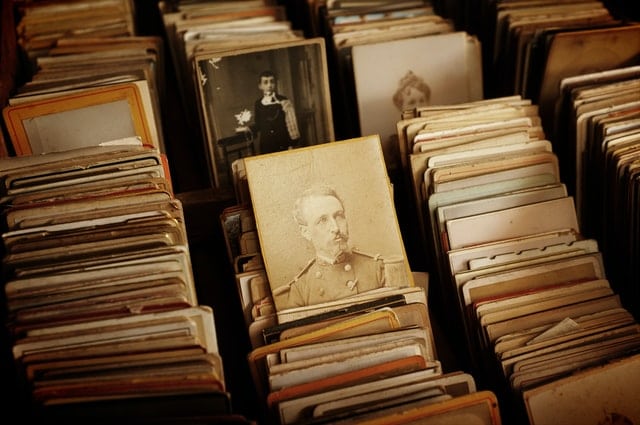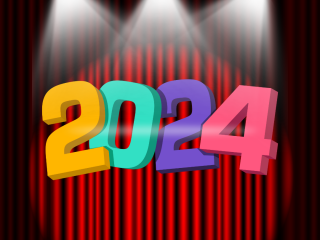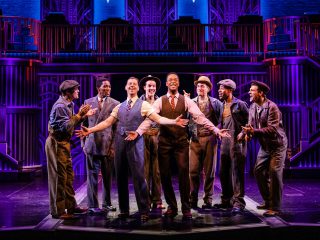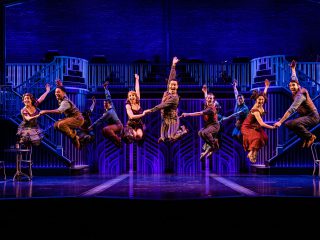We live in a world obsessed with “now”. Smart phones allow us instantaneous access, connection, and communication. The internet provides us information and entertainment at a moment’s notice. The latest technology promises to get it to us faster, hassle free. The world is at our fingertips. No time for nostalgia; we live in the present tense.
Theatre, on the other hand, is obsessed with “then”. An ancient art form (as far as art forms go), theatre’s charms are of the analog variety. Even though theatre is experienced live, its roots go way back. The act of going to see a play is an archaic practice, a retro reenactment of an ancient ritual. And plays themselves are often nostalgic in and of themselves, whether the plays are old (your Greek tragedies, your Shakespeare, your Molière), or whether the plays are about times past.
One would think our current “now”-obsessed culture and the backwards-looking theatre world would be antithetical to one another …. and yet, history plays are having a moment. Why? Why in this era of immediacy are our stages looking back? There are a few possible answers.

First of all, history plays have always been popular. There’s the joy of audience recognition (“Hey, I know that story!”) and the communal catharsis of experiencing a familiar tale with a mass of other spectators likewise “in-the-know”. There’s also the healing power of historical narratives. Shakespeare’s history plays such as Henry V, besides being jolly ol’ fun, were also attempts at making sense of England’s historical narrative – early faltering stabs at the forming of a national identity. The plays carved out a new-found sense of unity, of national pride, of patriotism. Perhaps we as audiences are still drawn to history plays for similar reasons; we want to make sense of what happened before us.
History plays, when they’re well-written and effectively staged, can give an audience a jolt of “fly on the wall” excitement – the exhilarating feeling of being present for events you could never have actually been present for outside of the magic of the theatre auditorium. We are currently living through a renaissance of “This-is-what-it was-like-then” plays, from The Audience by Peter Morgan (creator of Netflix’s The Crown) to All the Way by Robert Schenkkan; from Indecent by Paula Vogel, to a little ditty called Hamilton. Contemporary playwrights are spinning history into beautiful new tapestries and audiences are lapping it up.
Besides the thrill of being a time-traveling voyeur, modern history plays also allow an audience to deconstruct what’s come before, to analyze the events of our shared pasts in order to make sense of our present. Another possible reason for the current bonanza of history plays dancing across our stages could be the strong public desire to figure out “How did we get here?” – or more specifically, “What went wrong?”. Stefano Massini’s The Lehman Trilogy gives us insights into our current economic mess by looking back at hundreds of years of financial shenanigans. Stuff Happens by David Hare, The Laramie Project by Moisés Kaufman and members of the Tectonic Theater Project, and many of the plays by Lauren Gunderson are deep dives into specific historical moments that attempt to unravel the messy and destructive forces of history, moving us from confusion towards understanding.
History plays also afford an audience some good old fashioned escapism. The multitude of contemporary domestic dramas that paint portraits of the here and now can become tiresome in their banality, their familiarity, their smallness. Viewers long for the exotic, the transcendent. A quality history play can be an invitation to points unknown, an opportunity to travel to distant lands and distant times. Especially in a sea of kitchen sink dramas, audiences find great joy in jumping through time and space from the comfort of their cushy theatre seats.
Mix these causes together and you have a probable recipe for the current history play craze. Whether it’s the cathartic communion of watching a familiar story retold, or the giddy allure of eavesdropping on the thrilling and scandalous secret lives of real-life personalities from days gone by, or the mind-tickling excitement of grappling with the complexities of our shared past, history plays provide a little something for everyone. They are an invitation, an illumination, and in some ways a provocation: “Here’s what things were – now, what’s to come?”














